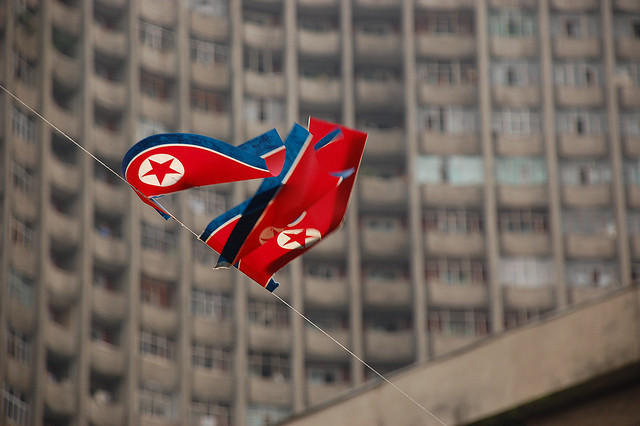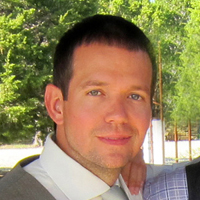North Korea is awful.
You can ask anyone.
Well, not anyone. You can’t ask the two comrades who were killed by a defecting soldier before he jogged across a minefield in the demilitarized zone, all just to get to South Korea. They remain tight-lipped, on account of their being dead.
But we’ll assume that the surviving soldier, and the 24,000 other people who have successfully defected either through the DMZ or into China, have pretty good reasons to get away from the Kim Jongs: starvation, indoctrination, emaciation—all the ations. The suffering that is the norm in North Korea inspires people to regularly risk their lives to seek something better. And we of course root for them.
Hooray for defectors. Good for them. Best of luck.
The trek through the DMZ is the most extreme example of a phenomenon playing out all over the world: Myanmar to Thailand, Syria to Turkey, the Sudan to anywhere. And it is an effort we all almost universally commend, largely because of the massive gap between country of origin and country of refuge. The problem is that the concept is very much susceptible to the “not in my backyard” mentality. And if you live in large parts of Texas, Arizona and California, your backyard is Mexico.
That’s pretty important, because right now people are trying to cross that border. Their reason is simple: they come from somewhere miserable. Maybe it’s the slums of Honduras, the lawless swaths of El Salvador or one of those places in Mexico where drug lords have made beheadings the national pastime. But what all of these people have in common is that they are fleeing something terrible.
Fear and poverty and oppression take many forms and come in many degrees, and they spread like seas, leaving good people isolated and hopeless. And if they do nothing, they will most assuredly drown.
So they try to find something better. And whatever your views on immigration or amnesty in the U.S., I know one thing: if any of us were thrashing around in that sea while staring at a lifeboat, we would think there’s room for one more.
Until we’re on the boat. Then that shit is full.
And that’s the problem. Those of us safely aboard have deemed the vessel fully occupied. And maybe there are practical arguments for that. I completely understand that there are fiscal and logistical issues to be discussed. And they should be discussed. But whatever those arguments, we can’t forget that we’re talking about people. Living, breathing, loving, hoping people. Pragmatism can be an effective tool, but don’t let it become an excuse, a piece of armor we wear during the debate so we no longer have to feel.
So, for these people fleeing from one country to another, we have to try to put ourselves in their shoes. Well, that’s a bad analogy because a lot of them don’t have shoes, but for the ones who do, try to put yourself in their Adiddas with an extra D because it was a factory defect handed out by some NGO. And feel what they feel.
Now, that’s easy for me, because growing up in El Paso, Texas, I regularly had to flee gang violence. When ESL threw down with LFL and the CFL (only two of those are real), we knew to keep our distance, lest we be hit in the head too many times with a palo. But my understanding is Honduras and El Salvador might be a shade worse.
So this is an issue that hits close to home for a few reasons. One is that it was always actually close to home. The other is that people around the world are trying desperately to do something I and countless others have done hundreds of times, with the greatest of ease, which is cross from one nation to another.
I am an American citizen, as are most of you reading this, so we pretty much have all access passes to the planet. They’re pretty handy. But it’s important to note that we’re not special. We’re lucky. There’s a very big difference. Our mothers’ uteri happened to be in the United States when we made our exits from the womb. I don’t think we should get a lot of credit for that. So to come and go as we please, and then cavalierly dismiss the needs of people who are not lucky, especially when we did exactly jack shit to earn that privilege, is a disservice to mankind.
Don’t dismiss the drowning when you were born on a boat.
I realize idealism has to balance with pragmatism. We should of course be talking about immigration and amnesty and refugees—and not just locally, but globally. Northern Africa, the Middle East and Southeast Asia all face serious refugee crises.
Consequently, those discussions have to happen and must address the difficult reality of limited resources and almost unlimited human suffering. That conversation is essential. But we need to bring some heart to the argument, and there are enough examples in interviews and social media posts to see that’s not always happening.
“Send them back” is said with a coldness that clearly ignores their circumstances.
But if we take the time to remember, to care, to empathize, I think we will be inspired to look at the issue a little more closely, a little more thoughtfully. And with that, maybe we’ll discover that we do have the means to help those who are struggling. Maybe it will turn out that their security doesn’t threaten ours. Maybe, just maybe, our boat is bigger than we thought.
~
Author’s Note: The seemingly cavalier introduction regarding the atrocities in North Korea are intended to highlight two key points: 1) The soldier who murdered two men and escaped to South Korea would be a villain in almost any other circumstances. However, the horrific conditions in North Korea make him a hero to most readers. 2) We are so accustomed to the fact that North Korea is awful that we have become desensitized to its ongoing tragedies, which if they occurred anywhere else in the world, would generate a massive public outcry, e.g. 1 million people starving to death in the 1990s. In general, the casual discussion of heinous realities mirrors the indifference among many politicians and voters (not that of the author), and it is done so in an effort to show how morally untenable such a position is.
~
References:
~
Relephant Reads:
Facts about North Korea, Highlighted by the Sony Controversy.
Human Rights Violations Around the World, in 1 Map.
~
Author: Dane Phillips
Editor: Alli Sarazen
Photo: Stephan/Flickr







Read 11 comments and reply